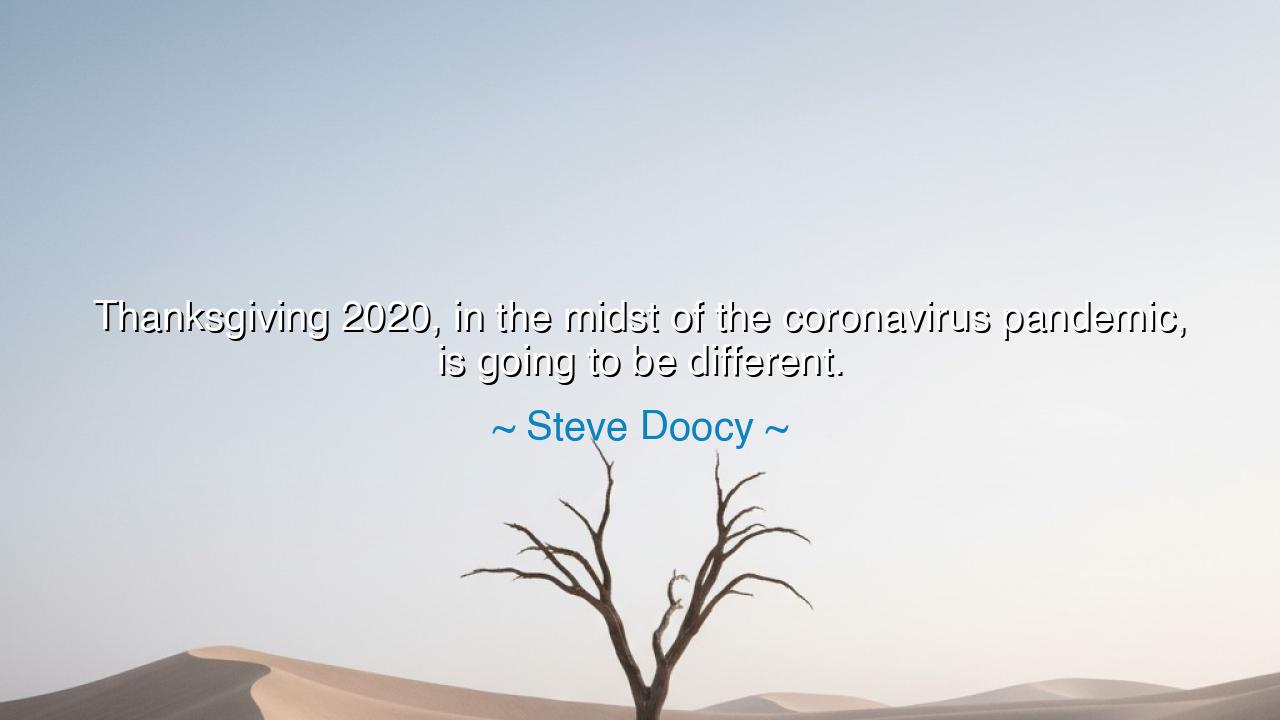
Thanksgiving 2020, in the midst of the coronavirus pandemic, is






The words of Steve Doocy—“Thanksgiving 2020, in the midst of the coronavirus pandemic, is going to be different.”—speak with the weight of a moment when the flow of tradition was disrupted by forces beyond human control. For centuries, Thanksgiving had been a time of gathering, of crowded tables and joyful reunions, of laughter echoing through homes warmed by food and love. Yet in the year 2020, a shadow fell across the earth. A plague unseen but deeply felt swept through nations, scattering families and silencing many voices. Doocy’s words capture the sorrow and the sobering truth: even the most cherished rituals are not immune to the storms of history.
The ancients understood that pestilence and plague had the power to reshape the rhythms of human life. Thucydides, in his history of the Peloponnesian War, wrote of the great plague of Athens that emptied streets, closed temples, and severed the bonds of community. What was once ordinary became extraordinary, and what was once expected became impossible. So it was with Thanksgiving 2020—a festival built upon togetherness was suddenly marked by distance, silence, and separation. The table was smaller, the gatherings were few, and the absence of loved ones was felt like a wound.
History, too, offers parallels of resilience in times of trial. During World War II, families across America and Europe celebrated holidays without fathers, brothers, and sons, who were away at war. The feast was simpler, rations were scarce, and the air was heavy with longing. Yet even then, families lit candles, said prayers, and gave thanks—not because times were easy, but because gratitude was an act of defiance against despair. Likewise, in 2020, to give thanks in the midst of pandemic was not to ignore suffering, but to choose hope despite it.
Doocy’s words remind us of a deeper truth: tradition is not destroyed when it changes. Thanksgiving did not cease in 2020; it adapted. Families gathered over screens instead of around tables. Meals were shared in smaller circles, and gratitude was spoken into cameras instead of across the room. The form was altered, but the essence endured. Gratitude, after all, does not depend on abundance or proximity—it depends on the heart. In that year of darkness, Thanksgiving became not a feast of plenty, but a meditation on survival, endurance, and the fragile gift of life itself.
The meaning here is profound: rituals are strongest when they bend, not when they break. A rigid custom shatters under strain, but a living tradition adapts and continues. Thanksgiving 2020, though different, carried the same spirit as the first Thanksgiving of 1621, when Pilgrims and Native Americans shared a meager feast after surviving near-starvation. It is not the grandeur of the table that sanctifies the holiday, but the act of pausing, remembering, and giving thanks—even when circumstances are harsh.
The lesson for us is this: gratitude must not depend on comfort. It is easy to give thanks when surrounded by abundance, when the table is full and the house is crowded with loved ones. But the truest gratitude is forged in adversity, when giving thanks feels almost impossible. To practice gratitude in hardship is to discover its deepest power—the ability to transform sorrow into strength, fear into faith, and loss into meaning.
Therefore, let your actions be these: carry forward the lesson of 2020. When life is disrupted, do not despair; adapt. When rituals must change, honor their spirit even in new forms. Give thanks not only when you have much, but also when you have little, for gratitude itself is the feast of the soul. Teach your children that hardship need not destroy tradition—it can deepen it.
Thus, Steve Doocy’s words, though simple, stand as a marker in history: Thanksgiving 2020 was different, but difference does not mean death. It was a reminder that gratitude shines brightest in darkness. Let this be remembered for future generations: when storms arise and traditions are tested, hold fast to the essence of love, unity, and thanksgiving, for these cannot be destroyed by plague or time.






AAdministratorAdministrator
Welcome, honored guests. Please leave a comment, we will respond soon